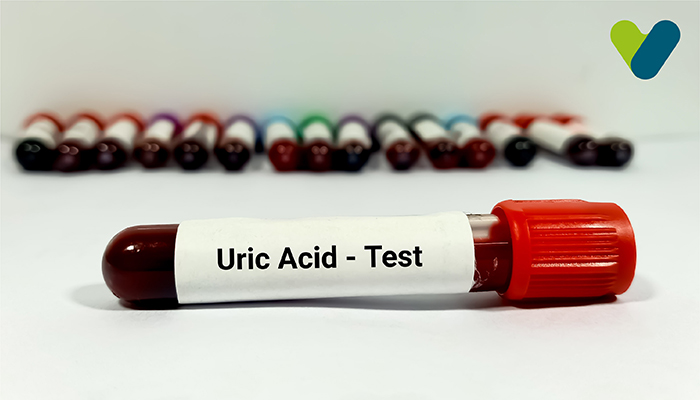A waste created when the body breaks down purines in the blood is called uric acid. Most of this acid often dissolves in the blood. It then passes through the kidneys and later leaves the body in urine.
How can one suffer from high levels of uric acid?
Various foods may increase uric acid levels in the body. These food items are usually very high in purine.Examples include :
- Seafood, Red meat, organ meats like liver
- Food and drinks with high fructose corn syrup and alcohol (especially beer, including non-alcoholic beer)
It's essential to treat this condition in the initial stages. Otherwise, high levels of uric acid can cause more permanent damage in bones, joints, and tissues, as well as some complex kidney and heart diseases.
How to treat high uric acid in the body?
Reduce food high in purineFood that includes meat, seafood, and some vegetables can be reduced in a regular diet. These foods include organ meat, pork, turkey, fish, mutton, veal, cauliflower, green peas, dried beans, mushroom, etc.
Reduce sugar and sugary beverages
Avoid added sugar that includes table sugar, corn syrup, etc. The element to be avoided here is sugar fructose, a simple sugar in processed and refined foods.
Beverages like sugary drinks, soda, or fresh fruit juices mainly concentrate on glucose-containing sugar. The fructose found in these beverages is often absorbed faster than sugar from the food that needs to be broken into smaller enzymes to be better digested. Faster absorption of sugar in the body spikes blood sugar levels and leads to a high level of uric acid formation.
Drink water
Drinking more water can help your kidneys to flush out uric acid faster. Ensure you drink 2-3L of water every day to keep body sugar levels in check and kidneys healthy.
Reduce alcohol
Consumption of alcohol shifts the focus of your kidneys from removing uric waste from blood to waste produced from alcohol. It can make you dehydrated and hence trigger high uric acid in the body. Drinks like beers are very high in purines.
Reduce weight
The truck is to remember not to reduce weight too quickly. Fat cells present in our body make more uric acid than muscle cells. High body fat also makes it difficult for kidneys to filter uric acid. Losing weight too quickly can add pressure to the kidneys, adversely affecting your body. Instead, opt for a healthy diet rich in fibre to reduce weight and control the level of purines in the body. Fibre can also help reduce blood sugar and insulin level and increase satiety which helps lower the risk of overeating.
Add more fibre to your diet
Eating more fibre will help your body get rid of uric acid. Fibre can also help balance your blood sugar and insulin levels. It also tends to increase satiety, helping reduce overeating.
Regulate stress levels
Poor sleeping habits, too much stress, and no physical exercise increase inflammation that may increase the level of uric acid in the body. Opt for a healthier lifestyle that includes morning walks, yoga, or sports to reduce stress. Opt for a healthy slew cycle that consists of 8 hours of sleep. Reduce screen time and avoid using mobile phones or televisions 2 hours before you go to sleep. Instead, opt for reading or radio to have a better sleep. Avoid caffeine during lunchtime.
What medications to use?
When it comes to medical treatments, there are two types of treatments. One that treats the inflammation caused in the knees and the other that helps reduce uric levels in the body.The kind of treatment your doctor will suggest may vary from the severity of the symptoms to any other medical condition you may suffer from.
Some common medicines used to treat gout attacks resulting from high uric acid in the body include:
Nonsteroidal anti-inflammatory drugs (NSAIDs)
Medicines such as ibuprofen and naproxen sodium along with indomethacin or celecoxib can help reduce inflammation.
Colchicine
Colchicine, an anti-inflammatory drug that helps reduce gout pain, may be recommended by your doctor.
Corticosteroids
Corticosteroid medications can help control inflammation and pain. These drugs can either be prescribed in tablets or inserted directly into your joints through injections.
Medications that block uric acid production
Medicines like allopurinol and febuxostat help limit the amount of uric acid in the body. On the other hand, probenecid helps kidneys remove uric acid from the body.


